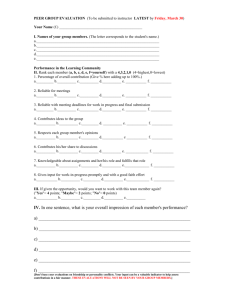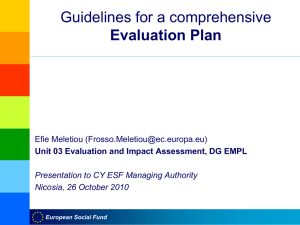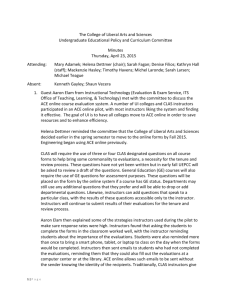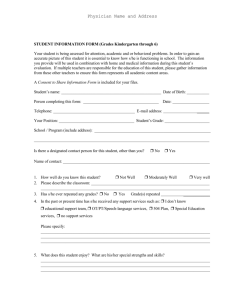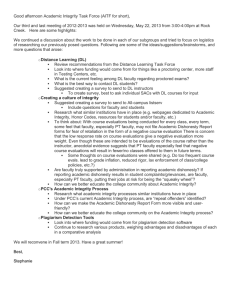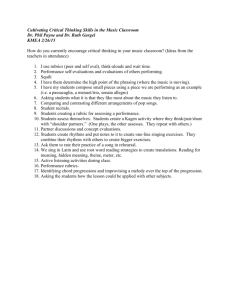The Undergraduate Educational Policy and Curriculum Committee
advertisement
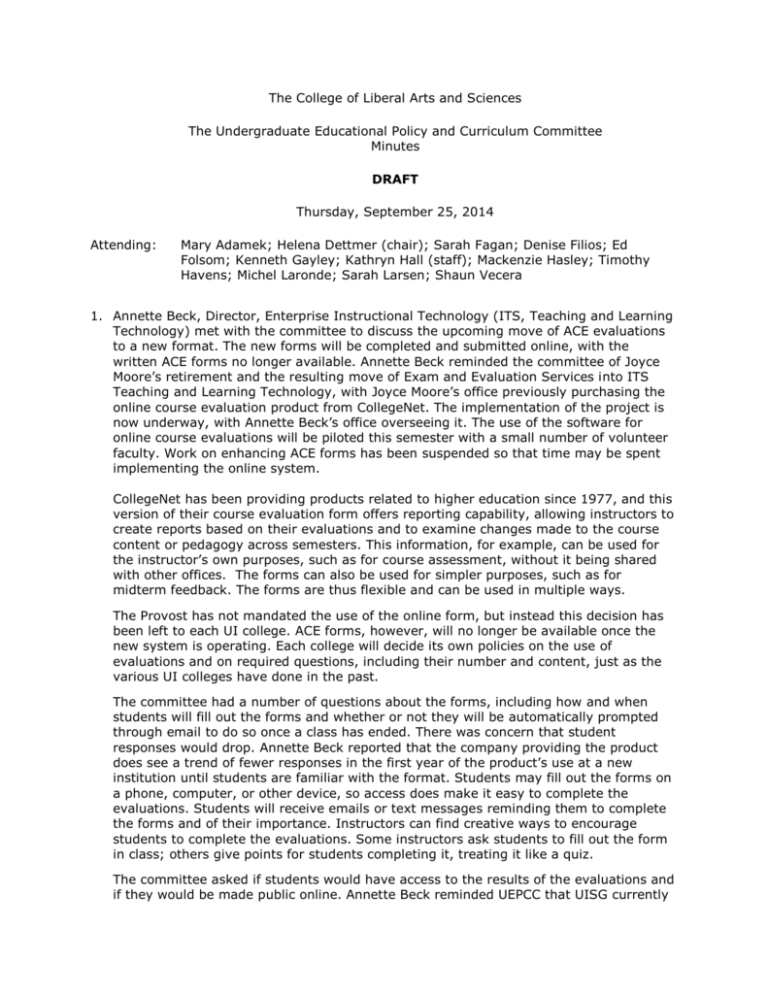
The College of Liberal Arts and Sciences The Undergraduate Educational Policy and Curriculum Committee Minutes DRAFT Thursday, September 25, 2014 Attending: Mary Adamek; Helena Dettmer (chair); Sarah Fagan; Denise Filios; Ed Folsom; Kenneth Gayley; Kathryn Hall (staff); Mackenzie Hasley; Timothy Havens; Michel Laronde; Sarah Larsen; Shaun Vecera 1. Annette Beck, Director, Enterprise Instructional Technology (ITS, Teaching and Learning Technology) met with the committee to discuss the upcoming move of ACE evaluations to a new format. The new forms will be completed and submitted online, with the written ACE forms no longer available. Annette Beck reminded the committee of Joyce Moore’s retirement and the resulting move of Exam and Evaluation Services into ITS Teaching and Learning Technology, with Joyce Moore’s office previously purchasing the online course evaluation product from CollegeNet. The implementation of the project is now underway, with Annette Beck’s office overseeing it. The use of the software for online course evaluations will be piloted this semester with a small number of volunteer faculty. Work on enhancing ACE forms has been suspended so that time may be spent implementing the online system. CollegeNet has been providing products related to higher education since 1977, and this version of their course evaluation form offers reporting capability, allowing instructors to create reports based on their evaluations and to examine changes made to the course content or pedagogy across semesters. This information, for example, can be used for the instructor’s own purposes, such as for course assessment, without it being shared with other offices. The forms can also be used for simpler purposes, such as for midterm feedback. The forms are thus flexible and can be used in multiple ways. The Provost has not mandated the use of the online form, but instead this decision has been left to each UI college. ACE forms, however, will no longer be available once the new system is operating. Each college will decide its own policies on the use of evaluations and on required questions, including their number and content, just as the various UI colleges have done in the past. The committee had a number of questions about the forms, including how and when students will fill out the forms and whether or not they will be automatically prompted through email to do so once a class has ended. There was concern that student responses would drop. Annette Beck reported that the company providing the product does see a trend of fewer responses in the first year of the product’s use at a new institution until students are familiar with the format. Students may fill out the forms on a phone, computer, or other device, so access does make it easy to complete the evaluations. Students will receive emails or text messages reminding them to complete the forms and of their importance. Instructors can find creative ways to encourage students to complete the evaluations. Some instructors ask students to fill out the form in class; others give points for students completing it, treating it like a quiz. The committee asked if students would have access to the results of the evaluations and if they would be made public online. Annette Beck reminded UEPCC that UISG currently has permission to view core questions on the ACE forms; however, the manner in which this information is shared makes it difficult for it to be useful to the students. Each college will need to decide what is shared and the information’s format. In the future, the form will be linked to ICON; the forms will not be linked to just one class but will be “deep linked” so students see all the evaluations they need to complete at once. Viewing final grades will be a separate function at each course site or through the student’s ISIS account. The committee briefly discussed whether or not grades could be held until the forms are completed, but this is not a feasible solution and has never been permissible. Educating students about the importance of evaluations is a better tactic. The online forms have many strengths, including the ease of saving them and submitting them to required offices. Also, the forms are completely anonymous since handwriting is not used and often in a smaller class an instructor frequently recognizes the students’ handwriting. Still, instructors must plan on educating students on the use of the online forms. The committee also wondered how data is saved and whether or not it was secure; the data is stored anonymously by CollegeNet and thus all FERPA regulations. Helena Dettmer noted that it would be important for Annette Beck to report back to UEPCC on the outcomes of the pilot and for the committee to discuss the project in more detail, especially in relation to CLAS policies and procedures. 2. Professor Michael Teague, Department of Health and Human Physiology, met with the committee to discuss the proposed minor in Sport and Recreation Management. He reminded the committee that last spring the Leisure Studies major was redesigned, with the Leisure Studies minor closed. A new major called Sport and Recreation Management was created from a previous track offered within the Leisure Studies major and was approved by the Regents in August 2014. A minor was not proposed at the time, with the department deciding to wait and see if there might be interest in a minor. The new Sport and Recreation Management BS has grown rapidly, with around 450 declared majors, and students have requested that a minor be added. To manage resources, the department is offering much of the curriculum online (as web-based courses and not as GIS offerings), saving classroom space while also keeping classes smaller. By next fall, 90% of the courses will be available online. The committee discussed the emphasis areas for the major, wondering if the minor would also reflect particular areas of interest. Michael Teague responded that students could select coursework with the help of an advisor to tailor the minor to a targeted area, such as event planning or sport marketing. The committee recommended that these be clarified, and Michael Teague assured them they would be, both on advising handouts and online at the department’s website. After Professor Teague left, the group unanimously recommended the minor for approval. The proposal will now move to Faculty Assembly. 3. The meeting was adjourned. Respectfully submitted, Timothy Havens, Associate Professor, Department of Communication Studies and of African American Studies Secretary, Undergraduate Educational Policy and Curriculum Committee

